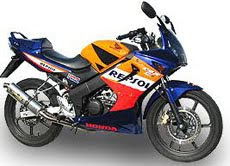 One question I get often is can I get more out my Honda CBR150. First the Honda CBR-150 is a nice looking machine, with sporty road bike racing features.
One question I get often is can I get more out my Honda CBR150. First the Honda CBR-150 is a nice looking machine, with sporty road bike racing features.It is said that Casey Stoner, Australian MotoGP rider started out on a Honda CBR150. What is the Honda CBR150 technical; the CBR150 comes with a 4 stroke, DOHC 4 Valves, water-cooled 149.4cc engine. The cylinder bore is 63.5mm and the stroke is 47.2mm (We can several other smaller cc motorcycle from Honda with the same bore), the compression ration is 11:1 and the ignition is by CDI Direct.
The standard spark plug is an NGK CR8E, but seen also CBR150's with a Denso U24ESR-N.
The transmission of Honda CBR150 comes with a 6 gear transmission, with a gear ratio from 3.038 for the first gear and a ratio of 0.923 for the last (6th) gear. Honda is using a wet, multiple disk clutch type for this motorcycle.
The dimensions of the bike are 652mm wide by 1,910 in length and 1,065 mm high. With a wheelbase of 1,286mm, all this specification indicates that it is a well-suited motorcycle for some road racing.
The dry weight of the bike is 115kilograms; the full fuel tank capacity is 10 liters unleaded gasoline octane 91 and up.
We need to keep focusing on performance that's affordable. This keeps us from manufacturing some tailor made individual parts to get the exact performance needs; also changing the bore or coating the cylinder bores with a Ceramic Coating is off they all fall out of the budget.
Okay looking at the standard bike, we are thinking what can we change to get at least some better performance. In the corner of my eye I see my girlfriend walking around with a block of aluminum, assuming that we are going to make a whole new cylinder. But after a quick telephone call with the bike owner, we concluded that it was far out of the budget.
So without the manufacturing of custom made parts we are restricted to the exhaust pipe, air-intake and carburetor. The exhaust pipe is the easiest part, we just bough a racing exhaust set. The air-intake was also easy; we just made the holes bigger so the air can flow much easier into the carburetor. Adjusting the main carburetor main fuel jet, and keeping track on the max and idle performance we got almost 32km/h more speed out of this bike. As we where examined the bike we also found that the chain and sprockets had to be replaced, as the bike clearly ad some more power we selected a small rear and a few teeth bigger front sprocket. The bike was now a fast little monster..
No comments:
Post a Comment